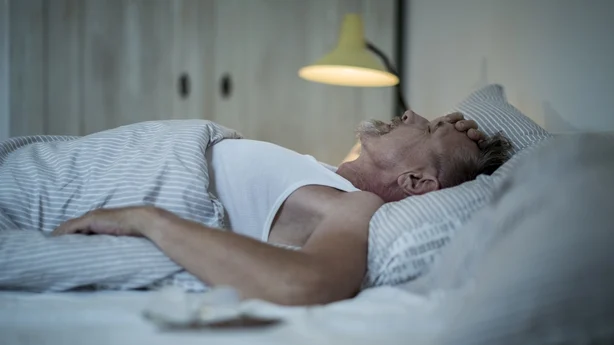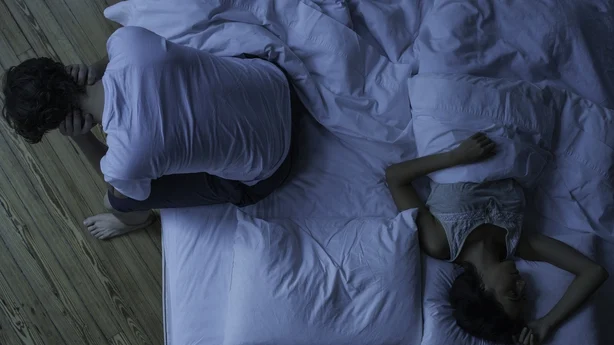If you regularly get six hours sleep a night, does that mean you're sleep deprived? If you get nine hours sleep a night, are you getting too much sleep? The answer, according to Professor Andrew Coogan from the Department of Psychology at Maynooth University, is it depends.
"For the average person, it’s between seven and eight hours for an adult. But of course, who’s average? And it varies quite widely between people. So actually, the message we prefer now is to personalise your sleep."
What does this mean? Well, it means that six hours could be the right amount for you or it could mean nine hours is your sweet spot. Coogan, director of the fabulously-named Chronobiology and Sleep Research Laboratory at Maynooth, tells Claire Byrne that sometimes the most obvious answer is the right answer.

"If you think you don’t have a problem, then you probably don’t have a problem."
So if you get six hours sleep and you have no difficulties making it through a normal day, then don’t stress over the fact that you "only" got six hours sleep. It is important though, to get the right amount of sleep for you, Coogan says. But what is the right amount of sleep for you? Again, it’s an amount of sleep you get that doesn’t leave you spending your day barely able to function.
"We like to think of sleep as one of the three key pillars of health with exercise and diet. And by that we mean both physical health and mental health. And we’re probably with sleep now where we were with exercise and diet maybe 20 years ago."
The good news is that – just like with exercise and diet – we can modify our sleep to get health benefits. But what if you can’t sleep? People suffering from chronic insomnia might hear talk of the potential health benefits of modifying sleep and roll their eyes, wishing they could just get any class of sleep at all.
"We can all do better probably with our sleep. But there is a significant group of people out there in the population – and we know they’re out there – who have a sleep disorder, who have something like chronic insomnia or sleep apnoea. And for those people they really need help and guidance through a healthcare professional."
There’s no way, Coogan says, to tweak or hack your way out of a sleep disorder. There are remedies – like cognitive behavioural therapy for insomnia – but unfortunately in Ireland, there aren’t enough therapists out there to deliver the treatment to all the people who need it.

"It’s very frustrating when you have to say to people, 'Look, I know what could possibly help you, but it’s just, that help isn’t there.’"
Coogan explained how cognitive behavioural therapy (CBT) works for people with sleep disorders such as insomnia. There are two main aspects to the therapy:
"Cognitive deals with our thoughts and our beliefs. So often people who have bad sleep have what we term maladaptive or unhelpful beliefs and thoughts about their sleep. So they might catastrophise, ‘Oh my god, I’m not sleeping, I’m going to be wrecked tomorrow, my life’s going to be a mess.’ So, it helps reset our patterns of thinking about sleep."
People who don’t sleep well, Coogan tells Claire, tend to see sleep as a threat. This means that the very act of going to bed triggers a stress reaction. The cognitive part of CBT attempts to reset those thoughts from unhelpful to helpful. And the behavioural part of it?

"The behavioural bit tweaks our behaviours. So, wind down in the run up to sleep, diet, exercise, maybe avoiding caffeine, maybe cutting down on alcohol. All these behavioural things that we know can also help."
And putting both parts together can help address some sleep disorders – such as insomnia – very effectively. But, Claire wants to know, what about the times you put the head down on the pillow and immediately start to worry about the little things you haven’t thought about all day? That’s called rumination and Coogan has one useful bit of advice for people who suffer from it:
"In the hour or two before bedtime, just write, make a list. Write five, ten things down that are worrying you, saying, ‘Look, I’m going to park them there. I’ll deal with them tomorrow. I’m going to wake up in the morning and look at my list and deal with them in the morning.’"
Indeed, a good night’s sleep often helps us deal with our problems, so it should be a win-win.
You can hear all of Claire’s conversation with Prof Andrew Coogan – including his answers to some listener questions – by clicking above.
Disclaimer: The copyright of this article belongs to the original author. Reposting this article is solely for the purpose of information dissemination and does not constitute any investment advice. If there is any infringement, please contact us immediately. We will make corrections or deletions as necessary. Thank you.






